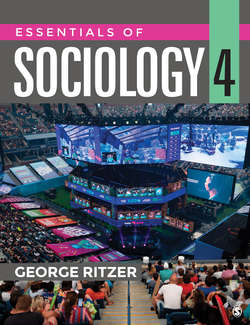Читать книгу Essentials of Sociology - George Ritzer - Страница 33
На сайте Литреса книга снята с продажи.
Sociology, the Other Social Sciences, and Common Sense
ОглавлениеSociology is one of the social sciences—that is, it is one of the fields that studies various aspects of the social world. Among the others are anthropology, communication studies, economics, geography, political science, and psychology. Generally speaking, sociology is the broadest of these fields; social scientists in other fields are more likely than sociologists to delve into specific aspects of the social world in much greater depth. Sociological study touches on the culture of concern to anthropologists, the nation-state of interest to political scientists, and the mental processes that are the focus of psychologists. However, that does not mean that sociology is in any sense “better” than—or, conversely, not as good as—the other social sciences.
Rather than comparing and contrasting these fields in general terms, this concluding section focuses on the different ways in which these fields approach one of this book’s signature concerns—globalization.
Anthropology: Focuses on cultural aspects of societies around the world, such as the foods people eat and how they eat them, as well as the differences among cultures around the globe.
Communication studies: Examines communications across the globe, with the internet obviously of focal concern in the contemporary world.
Economics: Investigates the production, distribution, and consumption of resources through markets and other structures that span much of the globe, especially those based on and involving money.
Geography: Studies spatial relationships on a global scale and maps those spaces (Herod 2009).
Political science: Studies nation-states, especially the ways in which they relate to one another around the world as well as how they have grown increasingly unable to control global flows of migrants, viruses, recreational drugs, internet scams, and the like.
Psychology: Examines the ways in which individual identities are shaped by increased awareness of the rest of the world and tensions associated with globalization (e.g., job loss), which may lead to individual psychological problems such as depression (Lemert and Elliott 2006).
Sociology encompasses all these concerns, and many others, in its approach to globalization. It studies globe-straddling cultures (such as consumer or fast-food culture), relationships between political systems (the European Union and its member nations, for example), communication networks (such as CNN and Al Jazeera or Twitter and Facebook), and markets (for labor or stocks and bonds, for example) that cover vast expanses of the globe. Sociology maps all of these, and even their impacts (both good and bad) on individuals. You might want to study the other fields to get a sense of the depth of what they have to offer on specific aspects of globalization. However, if you are looking for the field that gives you the broadest possible view of all of these things as well as the ways in which they interrelate, that field is sociology.
While sociology and the other social sciences differ in important ways, they are all quite different from commonsense understandings of the social world. Everyone participates in globalization in one way or another. However, few if any people research these phenomena in the same rigorous way and to the same degree that social scientists examine them. That research leads, among other things, to a greater understanding of the nature of globalization. For example, you probably have a sense that globalization has changed society—perhaps even an impression that it is changing your life. What you are unlikely to know are globalization’s causes, effects, and linkages to other social phenomena, or its largely invisible effects on society and the world. Research on the topic is also likely to yield much more insight into the pros and cons of globalization on personal, societal, and global levels. Such detailed knowledge and insight will help you, and others, to navigate more successfully the accompanying changes in social processes and structures.
One example of the gap between common sense and social scientific knowledge relates to perceptions of the causes of climate change. There is strong consensus in the scientific community that global warming is occurring and that it is caused primarily by human activities, especially the burning of fossil fuels. However, data from a recent survey, illustrated in Figure 1.6, show that only 70 percent of Americans believe that global warming is happening and just 53 percent believe that it is caused by human activity. Furthermore, 28 percent think that there is a lot of disagreement among scientists about the causes of global warming (Howe et al. 2015).
Description
Figure 1.6 Estimated Percentage of Adults Who Think Climate Change Is Happening, 2018
Source: Howe, Peter D., Matto Mildenberger, Jennifer R. Marlon, and Anthony Leiserowitz (2015). “Geographic Variation in Opinions on Climate Change at State and Local Scales in the USA.” Nature Climate Change, doi:10.1038/nclimate2583, via Yale Climate Opinion Maps–U.S. 2018 (http://climatecommunication.yale.edu/visualizations-data/ycom-us-2018/).
While common sense is important, even to sociologists, there is no substitute for the systematic study of the social world in both its minutest detail and its broadest manifestations. ●
